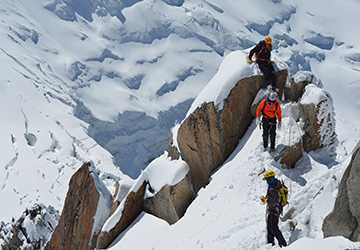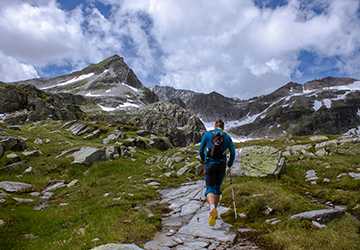Nature's grandeur, untamed landscapes, and the whispering winds through towering trees – the allure of national parks is irresistible to those seeking an escape into the heart of the wild. If you're yearning to trade the hustle and bustle of daily life for the serenity of untouched nature, it's time to lace up your hiking boots and embrace the exhilarating world of seasoned hikers.
Exploring national parks as a seasoned hiker isn't just about conquering trails; it's about forging a profound connection with the great outdoors. This guide is your compass to navigate the vast wilderness, offering insights, tips, and knowledge accumulated over countless trails and sunsets. Whether you're a novice hiker seeking inspiration or a seasoned trekker looking to up your game, this journey into the heart of national parks promises to be transformative.

Before you even pack your hiking boots, take some time to research the national park you plan to visit. Each garden is unique, with different trails, wildlife, and terrain. Look for trail maps, elevation profiles, and information on difficulty levels. Websites and park visitor centres are:
· Valuable resources.
· Providing insights into current weather conditions.
· Trail closures.
· Any wildlife activity you should be aware of.
Planning also involves checking for necessary permits. Some trails or backcountry areas may require access to regulate the number of visitors and protect the environment. Make sure to secure any licenses well in advance to avoid disappointment.
Having the right gear can make or break your hiking experience. While seasoned hikers might have all the bells and whistles, you don't need a high-end wardrobe to enjoy the trails. Invest in a comfortable pair of hiking boots with good ankle support and tread suitable for the terrain you'll encounter. Break them in before your trip to prevent painful blisters.
Pack a daypack with essentials like a snack, a water bottle, a first aid kit, a map, and a compass. Dress in layers, considering the weather fluctuations common in many national parks. A lightweight, moisture-wicking base layer is excellent for managing sweat, while a waterproof jacket can be a lifesaver in unexpected rain.
National parks are not just for us; they are habitats for diverse flora and fauna. Respecting nature is crucial for preserving these ecosystems for future generations. Follow the Leave No Trace principles: pack out all trash, stay on marked trails, and avoid disturbing wildlife. Keep a safe distance from animals, even if they seem friendly.
Minimize your impact by sticking to established campsites and trails. Avoid trampling on fragile vegetation; never pick plants or disturb cultural or historical sites. Being a responsible hiker means leaving the park as beautiful as you found.
Nature is unpredictable, and even the best-laid plans can go awry. Before heading out, let someone know your itinerary, expected return time, and the trails you plan to hike. In case of emergencies, this information can be vital for rescue teams.
Carry a fully charged phone, a portable charger, and a paper map. While technology is handy, it's possible. Familiarize yourself with basic navigation skills, like using a compass, in case you lose your way. Pack extra food and water in case your adventure takes longer than anticipated.
Hiking in a national park is not a race. Take the time to soak in the beauty of your surroundings. Listen to the rustling leaves, watch wildlife, and enjoy the panoramic views. Rushing through the trails might cause you to miss hidden gems and overlook the small wonders that make each park unique.
If tackling a challenging hike, know your limits and take breaks when needed. Stay hydrated and listen to your body. Hiking is not only about reaching the summit; it's about the journey, the experiences, and the memories you create along the way.

Nature is dynamic, and trail conditions can change rapidly, especially in national parks with varying elevations and weather patterns. Before embarking on your hike, check for any recent updates on trail conditions, closures, or warnings. Most national parks have websites or visitor centres that provide real-time information.
Understanding and following park regulations is equally important. Some trails may have seasonal restrictions to protect wildlife during sensitive times, while others may be closed for maintenance. You ensure your safety and contribute to the park's preservation efforts by staying informed.
While we all hope for a smooth hiking experience, accidents can happen. Being equipped with basic wilderness first aid knowledge can significantly impact an emergency. Consider taking a wilderness first aid course to learn essential skills like treating cuts and sprains and recognizing signs of dehydration or heat-related illnesses.
Carry a compact first aid kit with essentials like bandages, antiseptic wipes, pain relievers, and any personal medications you may need. Knowing how to use these items could be invaluable in addressing minor injuries or providing temporary relief until professional help is available.
National parks are not just about the trails; they're also about the people who share a love for the outdoors. Connect with fellow hikers through online forums, social media groups, or local hiking clubs to exchange tips experiences, and even find hiking buddies. The hiking community is often a valuable source of information, offering insights into hidden gems and less crowded trails.
Feel free to contact park rangers for advice or clarification on trail conditions. Rangers know the park's terrain, wildlife, and safety protocols. They can provide personalized recommendations based on your interests and skill level, ensuring a more tailored and enjoyable hiking experience.
Exploring national parks like a seasoned hiker is about preparing, respecting nature, and embracing adventure. By researching, gearing up wisely, practising Leave No Trace ethics, being ready for the unexpected, and enjoying the journey, you'll be on your way to an epic and memorable outdoor experience. So, lace up those boots, hit the trails, and let the national parks weave their magic on you. Happy hiking!